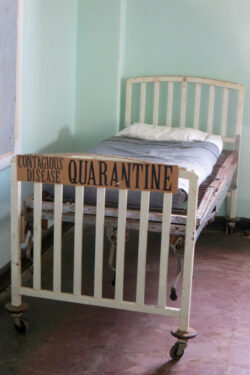Seeking Justice: Camp Lejeune Water Contamination and Jacksonville’s Fight for Compensation
The repercussions of the Camp Lejeune water contamination in Jacksonville echo through the city's population. The contaminants, linked to a multitude of health conditions, have spurred the inception of the Camp Lejeune Justice Act. This legislation allows victims to seek compensation, aided by legal teams offering pro-bono case reviews.

This article delves into the gravity of the issue, the legal recourse available, and the long-term health impacts, shedding light on Jacksonville's fight for justice.
Key Takeaways
- Contaminated drinking water at Camp Lejeune put hundreds of thousands of people at risk for cancer and other serious illnesses.
- Jacksonville veterans and families who lived at Camp Lejeune may have been exposed to this dangerous drinking water.
- Filing a Camp Lejeune water contamination lawsuit is the only means Jacksonville individuals and families have to obtain compensation for suffering, damages, and loss.
- Camp Lejeune water attorneys serving Jacksonville have a long track record of success in winning compensation for persons and families harmed by exposure to carcinogens.
Understanding the Severity of Camp Lejeune Water Contamination
The severity of the Camp Lejeune water contamination is underscored by its linkage to fifteen different illnesses and medical conditions, and the exposure of hundreds of thousands of individuals to harmful chemicals known to cause cancer and other severe diseases.
These chemicals, including known carcinogens such as trichloroethylene, benzene, and vinyl chloride, infiltrated the base's water supply, posing substantial health risks.
The dangers of these toxic chemicals have resulted in ongoing health concerns among the exposed population, with diseases including leukemia, kidney cancer, and non-Hodgkin lymphoma.
Despite remediation efforts, the long-term effects of this exposure continue to be a significant concern, necessitating further research into the full extent of the contamination's impact.
Legal Recourse for Jacksonville Residents: Camp Lejeune Water Lawsuits
Legal recourse for affected residents is made available through lawsuits, providing an avenue for them to file claims against the U.S. Government for exposure to harmful chemicals.
The legal process involved comprises several key stages:
- Filing a claim: Affected individuals must file a claim against the U.S. Government, detailing the extent of exposure and resultant health issues.
- Evidence presentation: Comprehensive medical records and proof of residence at Camp Lejeune during the contamination period are required.
- Determination of compensation eligibility: Criteria for eligibility include the type and severity of illness, duration of exposure, and connection between exposure and illness.
- Award of compensation: If the claim is successful, compensation may be granted to cover medical expenses, lost wages, pain, and suffering.
The Vital Role of Camp Lejeune Water Attorneys for Jacksonville Residents
Representation by experienced attorneys is essential for residents affected by harmful exposure, as it substantially increases the chances of a successful claim against the U.S. Government. Legal support is vital in navigating the intricate process of filing a Camp Lejeune water contamination lawsuit.
With a thorough understanding of the Camp Lejeune Justice Act, attorneys can assist in identifying viable compensation options. The complexity of these cases necessitates legal expertise to effectively link the reported illnesses to the water contamination incident. Attorneys provide vital assistance in gathering necessary evidence, presenting a compelling case, and ensuring that residents receive the compensation they deserve.
The role of legal professionals in these proceedings underscores the importance of securing reliable legal representation in such matters.
How to File a Camp Lejeune Justice Act Claim in Jacksonville
Initiating a claim under the Justice Act requires a comprehensive understanding of the eligibility criteria and procedural requirements, as well as a detailed documentation of the health impacts suffered due to the exposure. The filing process necessitates:
- Thorough documentation of the claimant's health condition directly linked to the Camp Lejeune water contamination.
- Verification of the claimant's presence in the affected area during the period of contamination.
- Substantive proof of the claimant's disease being one of the fifteen recognized by the Veterans Affairs Department.
- Adherence to the Justice Act's stipulations during the filing process.
Understanding these eligibility requirements is crucial for Jacksonville Veterans seeking compensation for health issues emanating from the Camp Lejeune water contamination. It is a rigorous process, yet necessary for obtaining the deserved compensation.
The Long-Term Health Impact of Camp Lejeune Water Contamination
Exposure to the harmful chemicals present in the drinking water supply systems has resulted in a range of severe health conditions among the residents, revealing the profound long-term impact of this public health crisis. The health consequences include various forms of cancer, neurological disorders, and other serious illnesses.
This catastrophic situation implicates the government responsibility to ensure public health safety. The lack of timely intervention and the failure to inform residents about the contamination at Camp Lejeune further exacerbate this crisis.
It is critical to highlight the long-term health impact of this water contamination, as it underscores the urgency for reforms in government policies and practices related to public health and environmental protection.
The Road to Compensation: Stories of Jacksonville’s Successful Lawsuits
Successful litigation cases have emerged in recent years, highlighting the pathway for victims of hazardous drinking water to attain deserved remuneration. These cases underscore the importance of justice for Jacksonville residents who have suffered due to water contamination at Camp Lejeune.
The lawsuits have achieved several crucial outcomes:
- Victims have been accorded compensatory damages, acknowledging the profound health impact of the contamination.
- They have established legal precedents for future claims.
- They have brought awareness to the issue, prompting stricter environmental regulations.
- They have provided some closure to victims, albeit not eradicating the emotional toll of Camp Lejeune water contamination lawsuits.
This ongoing struggle for justice serves as a potent reminder of the dire consequences of environmental neglect and the imperative for rigorous oversight.
Frequently Asked Questions
How Long Did the Water Contamination at Camp Lejeune Last?
The water contamination at Camp Lejeune persisted for over four decades, exposing veterans and their families to harmful chemicals, thereby necessitating preventive measures to mitigate the adverse contamination effects on the exposed populations.
What Specific Chemicals Were Found in the Water at Camp Lejeune?
Chemical Impact Analysis reveals that the water at Camp Lejeune contained over seventy harmful chemicals, including benzene and industrial solvents. Despite Contamination Prevention Measures, significant health risks ensued from this prolonged exposure.
How Long Does It Take for a Camp Lejeune Water Contamination Lawsuit to Be Resolved?
The resolution of a Camp Lejeune water contamination lawsuit varies, influenced by legal complexities, victim experiences, and litigation processes. It typically spans several years, reflecting the time required for comprehensive legal investigations and court proceedings.
Are There Any Other Military Bases With Similar Water Contamination Issues Like Camp Lejeune?
Indeed, several military bases, such as Fort Detrick and Patrick Air Force Base, have faced similar water contamination issues as Camp Lejeune. Preventive measures and understanding contamination impact are vital for future safety and health.
What Are Some of the Symptoms or Health Issues That Could Indicate Exposure to the Camp Lejeune Contaminated Water?
Exposure to the contaminated water at Camp Lejeune could manifest in several health issues, including various types of cancer, leukemia, infertility, and neurological disorders. Preventive measures and compensation policies are crucial in addressing such serious health implications.

This post has been generated by AI and was not reviewed by editors. This is Not legal advice. Please consult with an attorney.




